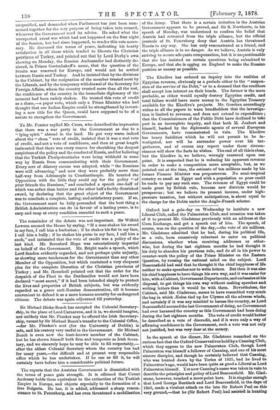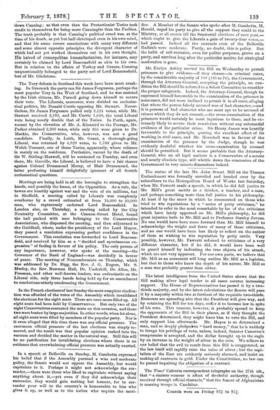In the speech at the dinner, Mr. Gladstone remarked on
the curious fact that the Oxford Conservatives hold bya Canning Club, which they oppose to the new Palmerston Club, though Lord Palmerston was himself a follower of Canning, and one of his most sincere disciples, and though he certainly believed that Canning, who was hunted down by the Tories of 1825, had he lived to Palmerston's age, would have been quite as good a Liberal as Lord Palmerston himself. Yet now Canning's name was taken in vain to describe the principles and policy of Lord Beaconsfield. Mr. Glad- stone, however, touched a moot point here. It is singular enough that Lord George Bentinck and Lord Beaconsfield, in the days of 1846, made & virulent attack on the late Sir Robert Peel on this very ground,—that he (Sir Robert Peel) had assistea in hunting
down Canning ; so that even then the Protectionist Tories took credit to themselves for being more Canningite than the Peelites. The truth probably is that Canning's political creed was, at the time of his death, as yet but half-developed even in his own mind, and that his name covers associations with many very different and some almost opposite principles, the divergent character of which had not yet worked themselves out in his own thought. His hatred of cosmopolitan humanitarianism, for instance, may certainly be claimed by Lord Beaconsfield as akin to his own. But in relation to the affairs of Turkey and Greece, Canning 'unquestionably belonged to the party not of Lord Beaconsfield, but of Mr. Gladstone.



































 Previous page
Previous page